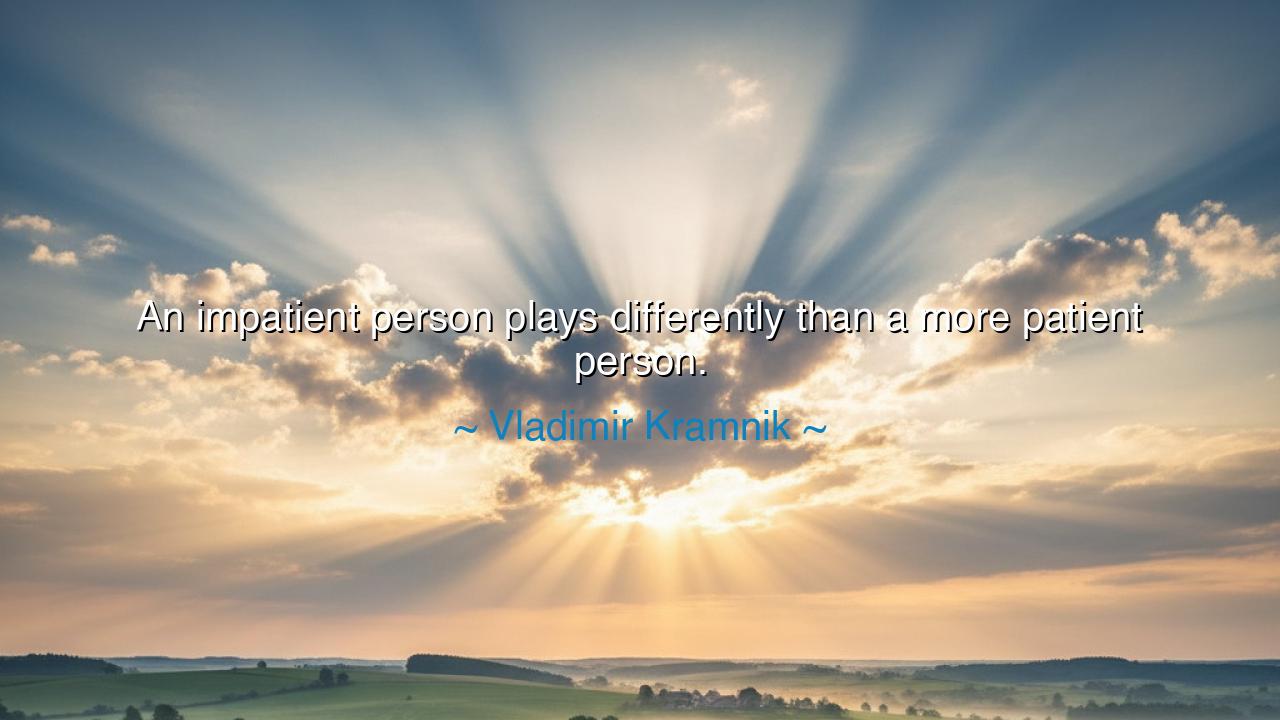
An impatient person plays differently than a more patient






Hear the words of Vladimir Kramnik, grandmaster of the mind’s battlefield, who declared with the calm authority of one who has known both triumph and trial: “An impatient person plays differently than a more patient person.” At first, this saying may appear simple, but beneath its surface lies a depth as vast as the ocean. For patience and impatience are not merely moods of the heart—they are forces that shape every action, every choice, and every destiny. The one who rushes sees only the moment; the one who waits sees the whole horizon.
The origin of this wisdom lies in the game of chess, that eternal mirror of life where kings and pawns march according to human will. Kramnik, world champion and strategist of the highest order, knew that victory is not seized in a single blow, but cultivated through foresight, endurance, and restraint. The impatient player lunges at what glitters, sacrificing structure for fleeting advantage, often crumbling when the tide turns. The patient player, however, waits like the hunter in the forest, silent, steady, content to prepare the ground until the prey steps into the trap. Thus in chess, as in life, character is revealed not in the opening move but in the endurance of the long struggle.
The ancients too saw this truth. In the campaigns of Hannibal against Rome, his lightning victories at Trebia and Cannae dazzled the world, but impatience led him to falter when he might have struck decisively at the heart of Rome. Rome, on the other hand, practiced patience—bleeding, retreating, enduring, until the years wore Hannibal down. The impatient genius fell, while the patient empire prevailed. Kramnik’s wisdom echoes through centuries: the way one plays is shaped not only by skill, but by the discipline of the spirit.
Consider also the tale of the Japanese swordsman Miyamoto Musashi. In duel after duel, he faced opponents who rushed forward with speed and fury. Musashi, by contrast, wielded the art of waiting—measuring his adversary, conserving his strength, and striking only when the fatal opening appeared. His patience became his shield, his sword, and his victory. In the same way, life’s battles are not won by those who exhaust themselves in haste, but by those who endure, watch, and strike with precision when the time is ripe.
What Kramnik teaches us, then, is that our inner state of patience or impatience changes not only how we play games, but how we live. The impatient one burns through opportunities, scattering energy like sparks in the wind. The patient one conserves, builds, and grows, turning small steps into a mighty march. The impatient may dazzle in the moment, but the patient endures to see the harvest. And so the way we “play” in work, in love, in struggle, and in ambition is determined less by talent than by the rhythm of our spirit.
The lesson for future generations is plain: cultivate patience, for it is the soil in which wisdom grows. Do not rush to seize every glittering chance, nor despair when results delay. Instead, learn to see the long game—the game beyond the moment, beyond the day, even beyond the year. For impatience blinds, but patience reveals. Impatience wastes, but patience multiplies.
Therefore, let your actions be thus: when faced with a choice, pause and consider not only the immediate reward but the deeper cost. When frustrated by delay, remind yourself that strength ripens in waiting, as fruit ripens on the branch. When others rush and falter, stand firm in the discipline of endurance. For as Kramnik proclaimed, your spirit shapes your play—and if you choose patience, then your every move, in chess and in life, will carry the weight of inevitability.






AAdministratorAdministrator
Welcome, honored guests. Please leave a comment, we will respond soon